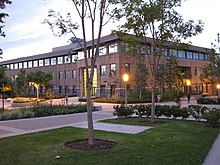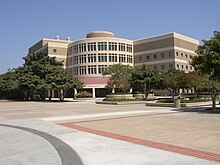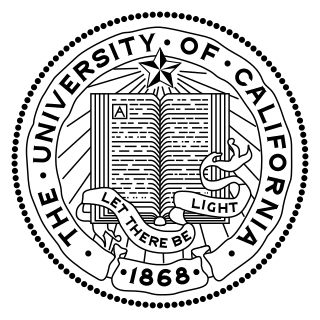
The University of California (UC) is a public land-grant research university system in the U.S. state of California. Headquartered in Oakland, the system is composed of its ten campuses at Berkeley, Davis, Irvine, Los Angeles, Merced, Riverside, San Diego, San Francisco, Santa Barbara, and Santa Cruz, along with numerous research centers and academic centers abroad. The system is the state's land-grant university.
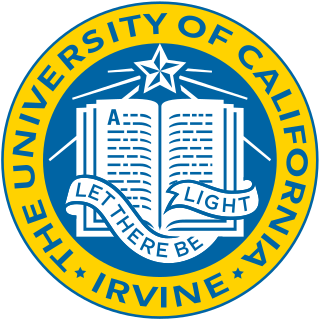
The University of California, Irvine is a public land-grant research university in Irvine, California, United States. One of the ten campuses of the University of California system, UCI offers 87 undergraduate degrees and 129 graduate and professional degrees, and roughly 30,000 undergraduates and 7,000 graduate students were enrolled at UCI as of Fall 2024. The university is classified among "R1: Doctoral Universities – Very high research activity" and had $534.9 million in research and development expenditures in 2022. UCI became a member of the Association of American Universities in 1996.
An Undergraduate Research Opportunities Program provides funding and/or credit to undergraduate students who volunteer for faculty-mentored research projects pertaining to all academic disciplines.
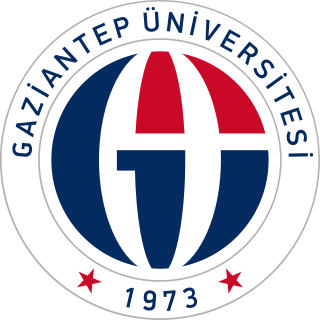
Gaziantep University is a public university established on June 27, 1987, traces its origins to 1973 as an extension campus of the Middle East Technical University. Located in Gaziantep, Turkey, the university has 20 faculties and is recognized for its focus on scientific and technological research. The main campus is near Gaziantep's city center, with additional campuses in neighboring areas. English is the primary language of instruction, and the university ranked among the top 1,000 in the Times Higher Education World University Rankings for 2020–2021.
The Paul Merage School of Business is the business school at the University of California, Irvine (UCI). It is one of the university's 14 academic units. The current Dean is Ian O. Williamson. The school confers Master of Business Administration (MBA) and Doctor of Philosophy (Ph.D.), degrees Master of Accountancy (MPAc) program, Master of Science in Biotechnology Management (MSBTM), Master of Science in Engineering Management (MSEM), and Bachelor of Arts in Business Administration.

The Donald Bren School of Information and Computer Sciences, also known colloquially as UCI's School of ICS or simply the Bren School, is an academic unit of the University of California, Irvine (UCI), and the only dedicated school of computer science in the University of California system. Consisting of nearly three thousand students, faculty, and staff, the school has three buildings in the southeast section of UCI's undergraduate campus, and maintains student body and research affiliations throughout UCI.

The Association of American Universities (AAU) is an organization of predominantly American research universities devoted to maintaining a strong system of academic research and education. Founded in 1900, it consists of 69 public and private universities in the United States as well as two universities in Canada. AAU membership is by invitation only and requires an affirmative vote of three-quarters of current members.
The Institute of Transportation Studies (ITS) at the University of California's Berkeley, Davis, Irvine, and Los Angeles campuses are centers for research, education, and scholarship in the fields of transportation planning and engineering. Faculty members, staff researchers, and graduate students comprise this multidisciplinary institute network of more than 400 people, which administers an average of $20 million in research funds each year. ITS Berkeley is an organized research unit with nine affiliated organizations and an eight-member advisory council.

The University of California, Irvine School of Law is the law school at the University of California, Irvine, a public research university in Irvine, California. Founded in 2007, it is the fifth and newest law school in the University of California system. At the time of its founding, it was the first new public law school in California in more than 40 years.
The campus of the University of California, Irvine is known for its concentric layout with academic and service buildings arrayed around a central park, and for its Brutalist architecture.
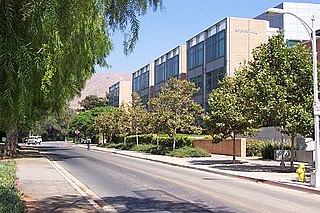
The University of California, Riverside, is organized into three academic colleges, two professional schools, and two graduate schools. These units provide 81 majors and 52 minors, 48 master's degree programs, and 42 PhD programs. It is the only UC campus to offer undergraduate degrees in Creative Writing and Public Policy, and one of only three UCs to offer an undergraduate degree in Business Administration. Additionally, UCR's doctoral program in the emerging field of Dance theory, founded in 1992, was the first program of its kind in the United States. UCR's various academic units are as follows:

The School of Humanities is one of the academic units of the University of California, Irvine. Upon the school's opening in 1965, the Division of Humanities was one of the five liberal arts divisions at the campus. Samuel McCulloch was appointed as UC Irvine's founding dean of Humanities in 1963. The School hosts the Thesaurus Linguae Graecae and the University of California Humanities Research Institute.

The School of Social Ecology (SSE) is a school at the University of California, Irvine (UCI) that focuses on social ecology. Students in SSE at UCI undergo a multidisciplinary program that examines real-world social and environmental issues, involves the students in off-campus internships and SSE offers undergraduate and graduate degrees, including bachelor's, professional master's, and Ph.D.s.
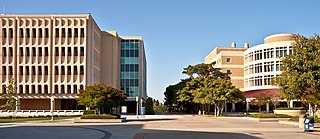
The School of Physical Sciences is an academic unit of the University of California, Irvine (UCI) that conducts academic research and teaching in the field of physical sciences. It offers both pre-professional training and general education in the departments of chemistry, earth system science, mathematics, and physics and astronomy. The school enrolls 1,400 undergraduate and graduate students and is one of the top schools in the nation in the number of degrees it confers in the area of physical sciences. It also offers specializations such as biochemistry, statistics, math for economics, applied and computational mathematics, astrophysics, applied physics, biomedical physics, and education. In 1995, the school gained international prominence when Frank Sherwood Rowland, a professor in chemistry and Frederick Reines, a professor in physics, won the Nobel Prize in their respective fields. It was the first time two people won the prize in the same year in two different fields at the same public university.

The Henry Samueli School of Engineering (HSSoE) is the academic unit of the University of California, Irvine that oversees academic research and teaching in disciplines of the field of engineering. Established when the campus opened in 1965, the school consists of five departments, each of which is involved in academic research in its specific field, as well as several interdisciplinary fields. The school confers Bachelor of Science, Master of Science, and Doctor of Philosophy degrees.
Fariborz Maseeh is an Iranian-American engineer who works in the field of micro-electro mechanical systems (MEMS). He founded IntelliSense in 1991 and sold it in 2000. He is the founder and managing principal of Surlamer LLC, an investment management firm managing investments in private companies, commercial and residential real estate, and several proprietary traded hedge funds. He also founded the Kids Institute for Development and Advancement (KIDA), a treatment clinic and education facility for autistic children in Irvine, California; Orbitron LP, a global macro long-short hedge fund; and The Massiah Foundation, a charitable organization of which he also serves as president..

The Hutton Honors College is the honors program of Indiana University Bloomington. The college was founded as the University Honors Division in 1966 with Warner Chapman as its director. It was renamed the Hutton Honors College in the fall of 2004 in honor of IU alumnus Edward L. Hutton. Its purpose serves to bring together students of various disciplines in an intellectually engaging manner, through research, creative projects, seminars, extracurricular activities, rigorous academics, travel abroad, and internships.

The School of Education is one of the academic units at the University of California, Irvine. Historically, it has been ranked as one of the top schools of education in the United States and world.
James Nowick is a professor of chemistry at University of California, Irvine. His research is focused on peptidomimetic (peptide-like) molecules and their potential applications to the study of amyloid-like protein aggregates, which are associated with neurodegenerative diseases such as Alzheimer's disease. Nowick is well known for his interest in chemistry education and is the organizer of the Open Chemistry series of video lectures distributed by UCI. Nowick is openly gay and in 2009 received the Scientist of the Year award from the National Organization of Gay and Lesbian Scientists and Technical Professionals (NOGLSTP), an affiliate of the American Association for the Advancement of Science.
Nicolaos Georgiou Alexopoulos is a Greek electrical engineer, former professor and university dean, and a champion of education and research. He currently serves as the Vice President for Academic Programs and University Relations at the Broadcom Foundation, and previously was Vice President for Antennas, RF Technologies, and University Relations at Broadcom Corporation from 2008 to 2015. In 2005, he received an honorary doctorate degree from the National Technical University of Athens "for contributions to education and research in engineering electrodynamics and for his public lectures on the 'Genesis and Destruction of the First Research University: The Museum/Library of Alexandria."


